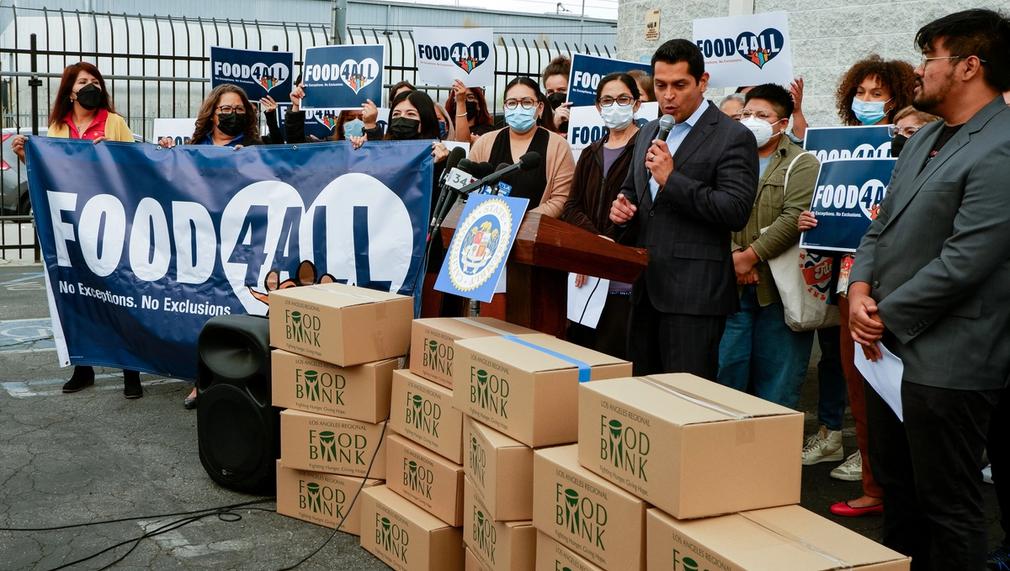Food For All- Expanding Food Benefits to All Angelenos, Regardless of Immigration Status
CIPC is committed to advancing food access initiatives and advocating for the inclusion of immigrant communities in public benefit programs to combat poverty. Among those, CIPC leads a statewide campaign to address food insecurity, Food for All, to dismantle exclusionary barriers, and will engage community-based organizations in Los Angeles to participate in state-level advocacy through coalition building, educational outreach, and media workshops.

What is the primary issue area that your application will impact?
Food insecurity and access to basic needs
In what stage of innovation is this project, program, or initiative?
Expand existing project, program, or initiative (expanding and continuing ongoing, successful work)
What is your understanding of the issue that you are seeking to address?
In 2021, there were 810,000 undocumented immigrants living in Los Angeles County. 41% live in poverty, which is nearly double the poverty rate of the county as a whole (21%). Food insecurity has increased in the county by over 20% since 2021 and disproportionately impacts Hispanic and Black immigrants. Undocumented immigrants are ineligible for state food assistance programs and can only access some county food assistance programs. The recent delayed implementation of the California Food Assistance Program (CFAP) for undocumented Californians 55+ magnifies the inequalities in our food system that continue to harm immigrant and BIPOC communities and will have significant impacts on over 810,000 undocumented Angelenos, especially the approximate 110,000 who could have benefited from the program. Given the delay, innovative strategies at local and state level are needed to ensure all people in Los Angeles can access nutritious food.
Describe the project, program, or initiative this grant will support to address the issue.
This grant will support the Food4All campaign, which seeks to address food insecurity for immigrant communities. Millions of income-eligible immigrants are excluded from CalFresh and other county programs due to their immigration status. Los Angeles houses the state’s largest share of undocumented immigrants excluded from CalFresh. In 2021, CIPC and Nourish CA launched the Food4All campaign. Since its beginning, the Food4All campaign has been driven by the leadership of Los Angeles residents and elected officials, including Assemblymember Miguel Santiago (AD-54) and the Board of Supervisors.
Thanks to the advocacy of the Food4All coalition, the state of California announced that CFAP food benefits would expand to low-income Californians age 55+ regardless of immigration status, beginning October 2025. However, in June 2024, a two year delay to this expansion was announced because of the state’s budget deficit.
Given this delay, CIPC will seek solutions to more expediently address food insecurity impacting the most underserved members in LA county. To do so, CIPC will work with impacted communities and partner organizations within Los Angeles to (1) host advocacy and media 101 trainings, (2) hold monthly coalition calls, and (3) amplify stories of food insecurity impacting immigrants. In this way, the coalition will build on the efforts to expand food access to Angelenos.
Describe how Los Angeles County will be different if your work is successful.
We envision Los Angeles County as a home where every resident, regardless of their immigration status, has consistent access to nutritious food. The connection between poverty and food insecurity is too interlinked to ignore the critical need for anti-hunger programs. CIPC’s Food4All campaign is to ensure that all Californians can afford and have access to adequate amounts of nutritious food, remove immigration status as an eligibility criterion for food assistance programs, and invest in the implementation of immigrant-inclusive food programs that build trust between immigrant populations and public benefit programs. We plan to build capacity and engage LA residents, through organizing efforts, to participate in advocacy where they can amplify their collective voice to improve food assistance programs to be more inclusive.
What evidence do you have that this project, program, or initiative is or will be successful, and how will you define and measure success?
CIPC will measure the impact of the Food4All campaign’s local efforts in Los Angeles in various ways to assess campaign effectiveness. This includes measuring policy changes such as new legislation, ordinances, or amendments supporting food access programs, tracking media coverage of Food4All from Los Angeles based news organizations, measuring levels of community and coalition engagement through educational outreach and workshop attendance (tracking number of attendees), and soliciting feedback from Los Angeles organizations on the strengths and effectiveness of our partnerships.
Approximately how many people will be impacted by this project, program, or initiative?
Direct Impact: 2,000.0
Indirect Impact: 810,000.0